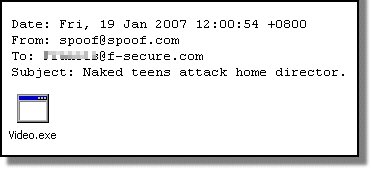Trojan-Downloader:W32/Small.DAM
Summary
This type of trojan secretly downloads malicious files from a remote server, then installs and executes the files.
Removal
Based on the settings of your F-Secure security product, it will either move the file to the quarantine where it cannot spread or cause harm, or remove it.
A False Positive is when a file is incorrectly detected as harmful, usually because its code or behavior resembles known harmful programs. A False Positive will usually be fixed in a subsequent database update without any action needed on your part. If you wish, you may also:
-
Check for the latest database updates
First check if your F-Secure security program is using the latest updates, then try scanning the file again.
-
Submit a sample
After checking, if you still believe the file is incorrectly detected, you can submit a sample of it for re-analysis.
Note: If the file was moved to quarantine, you need to collect the file from quarantine before you can submit it.
-
Exclude a file from further scanning
If you are certain that the file is safe and want to continue using it, you can exclude it from further scanning by the F-Secure security product.
Note: You need administrative rights to change the settings.
Technical Details
Trojan-Downloader:W32/Small.DAM is a variant from the Small malware family that loads a malicious service on the system.
Installation
The malware arrives on the system as an infected file attachment to spam email messages. If the user executes the malware by clicking on the attachment, the trojan drops the following files on the system:
- %SysDir%\wincom32.sys - Kernel mode driver component
- %SysDir%\peers.ini - Initialization file component
It also installs itself as a service with the name "wincom32" by creating the following registry keys:
- [HKEY_LOCAL_MACHINE\SYSTEM\CurrentControlSet\Services\wincom32]
- [HKEY_LOCAL_MACHINE\SYSTEM\CurrentControlSet\Enum\Root\LEGACY_WINCOM32]
Activity
The kernel mode driver is an advanced payload injector that carries a user-mode PE executable file. When the driver executes, it changes the services.exe process context and allocates new memory for the payload.
It then copies the PE executable from kernel memory to the address space of services.exe and prepares the image for execution. Finally, it queues an Asynchronous Procedure Call (APC) for services.exe to execute the payload in its context.
On execution, the service causes the system to send UDP packets from source port 4000 to IP addresses and destination ports taken from the "peers" section of the decoded initialization file. The initialization file also maintains a "blacklist" section.
Additional information about Small.DAM's activities can be found on our weblog.
Propagation
Small.DAM arrives on the system as an attachment file to spam emails. A sample of the email message can be seen below:

It may use any of the following strings as its Subject:
- 230 dead as storm batters Europe.
- A killer at 11, he's free at 21 and...
- British Muslims Genocide
- Naked teens attack home director.
- U.S. Secretary of State Condoleezza Rice has kicked German Chancellor Angela Merkel
Attachments may be any of the following filenames:
- Full Clip.exe
- Full Story.exe
- Read More.exe
- Video.exe
)
Protect your devices from malware with F‑Secure Total
Protecting your devices from malicious software is essential for maintaining online security. F‑Secure Total makes this easy, helping you to secure your devices in a brilliantly simple way.
- Award-winning antivirus and malware protection
- Online browsing, banking, and shopping protection
- 24/7 online identity and data breach monitoring
- Unlimited VPN service to safeguard your privacy
- Password manager with private data protection
More Support
Community
Ask questions in our Community .
User Guides
Check the user guide for instructions.
Submit a Sample
Submit a file or URL for analysis.